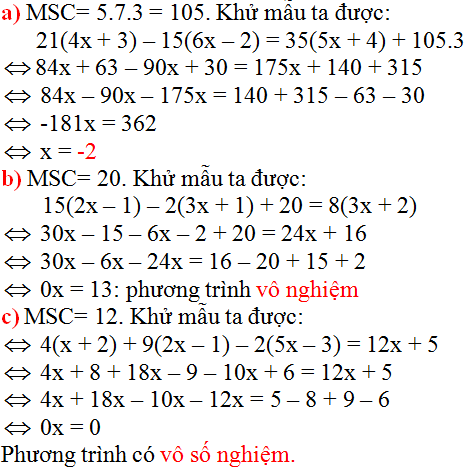Hãy nhập câu hỏi của bạn vào đây, nếu là tài khoản VIP, bạn sẽ được ưu tiên trả lời.

giải pt sau
g) 11+8x-3=5x-3+x
\(\Leftrightarrow\) 8x + 8 = 6x - 3
<=> 8x-6x = -3 - 8
<=> 2x = -11
=> x=-\(\dfrac{11}{2}\)
Vậy tập nghiệm của PT là : S={\(-\dfrac{11}{2}\)}
h)4-2x+15=9x+4-2x
<=> 19 - 2x = 7x + 4
<=> -2x - 7x = 4 - 19
<=> -9x = -15
=> x=\(\dfrac{15}{9}=\dfrac{5}{3}\)
Vậy tập nghiệm của pt là : S={\(\dfrac{5}{3}\)}
g)\(\dfrac{3x+2}{2}-\dfrac{3x+1}{6}=\dfrac{5}{3}+2x\)
<=> \(\dfrac{3\left(3x+2\right)}{6}-\dfrac{3x+1}{6}=\dfrac{5.2+6.2x}{6}\)
<=> 9x + 6 - 3x + 1 = 10 + 12x
<=> 6x + 7 = 10 + 12x
<=> 6x -12x = 10-7
<=> -6x = 3
=> x= \(-\dfrac{1}{2}\)
Vậy tập nghiệm của PT là : S={\(-\dfrac{1}{2}\)}
\(h,\dfrac{x+4}{5}-x+4=\dfrac{4x+2}{5}-5\)
<=> \(\dfrac{x+4-5\left(x+4\right)}{5}=\dfrac{4x+2-5.5}{5}\)
<=> x + 4 - 5x - 20 = 4x + 2 - 25
<=> x - 5x - 4x = 2-25-4+20
<=> -8x = -7
=> x= \(\dfrac{7}{8}\)
Vậy tập nghiệm của PT là S={\(\dfrac{7}{8}\)}
\(i,\dfrac{4x+3}{5}-\dfrac{6x-2}{7}=\dfrac{5x+4}{3}+3\)
<=> \(\dfrac{21\left(4x+3\right)}{105}\)-\(\dfrac{15\left(6x-2\right)}{105}\)=\(\dfrac{35\left(5x+4\right)+3.105}{105}\)
<=> 84x + 63 - 90x + 30 = 175x + 140 + 315
<=> 84x - 90x - 175x = 140 + 315 - 63 - 30
<=> -181x = 362
=> x = -2
Vậy tập nghiệm của PT là : S={-2}
K) \(\dfrac{5x+2}{6}-\dfrac{8x-1}{3}=\dfrac{4x+2}{5}-5\)
<=> \(\dfrac{5\left(5x+2\right)}{30}-\dfrac{10\left(8x-1\right)}{30}=\dfrac{6\left(4x+2\right)-150}{30}\)
<=> 25x + 10 - 80x - 10 = 24x + 12 - 150
<=> -55x = 24x - 138
<=> -55x - 24x = -138
=> -79x = -138
=> x=\(\dfrac{138}{79}\)
Vậy tập nghiệm của PT là S={\(\dfrac{138}{79}\)}
m) \(\dfrac{2x-1}{5}-\dfrac{x-2}{3}=\dfrac{x+7}{15}\)
<=> \(\dfrac{3\left(2x-1\right)-5\left(x-2\right)}{15}=\dfrac{x+7}{15}\)
<=> 6x - 3 - 5x + 10 = x+7
<=> x + 7 = x+7
<=> 0x = 0
=> PT vô nghiệm
Vậy S=\(\varnothing\)
n)\(\dfrac{1}{4}\left(x+3\right)=3-\dfrac{1}{2}\left(x+1\right)-\dfrac{1}{3}\left(x+2\right)\)
<=> \(\dfrac{1}{4}x+\dfrac{3}{4}=3-\dfrac{1}{2}x-\dfrac{1}{2}-\dfrac{1}{3}x-\dfrac{2}{3}\)
<=> \(\dfrac{1}{4}x+\dfrac{1}{2}x+\dfrac{1}{3}x=3-\dfrac{1}{2}-\dfrac{2}{3}-\dfrac{3}{4}\)
<=> \(\dfrac{13}{12}x=\dfrac{13}{12}\)
=> x= 1
Vậy S={1}
p) \(\dfrac{x}{3}-\dfrac{2x+1}{6}=\dfrac{x}{6}-6\)
<=> \(\dfrac{2x-2x+1}{6}=\dfrac{x-36}{6}\)
<=> 2x -2x + 1= x-36
<=> 2x-2x-x = -37
=> x = 37
Vậy S={37}
q) \(\dfrac{2+x}{5}-0,5x=\dfrac{1-2x}{4}+0,25\)
<=> \(\dfrac{4\left(2+x\right)-20.0,5x}{20}=\dfrac{5\left(1-2x\right)+20.0,25}{20}\)
<=> 8 + 4x - 10x = 5 - 10x + 5
<=> 4x-10x + 10x = 5+5-8
<=> 4x = 2
=> x= \(\dfrac{1}{2}\)
Vậy S={\(\dfrac{1}{2}\)}
g) \(11+8x-3=5x-3+x\)
\(\Leftrightarrow8+8x=6x-3\)
\(\Leftrightarrow8x-6x=-3-8\)
\(\Leftrightarrow2x=-11\)
\(\Leftrightarrow x=-\dfrac{11}{2}\)
h, \(4-2x+15=9x+4-2x\)
\(\Leftrightarrow-2x-9x+2x=4-4-15\)
\(\Leftrightarrow-9x=-15\)
\(\Leftrightarrow x=\dfrac{-15}{-9}=\dfrac{5}{3}\)

a: \(\Leftrightarrow20x^2-12x+15x+5< 10x\left(2x+1\right)-30\)
\(\Leftrightarrow20x^2+3x+5< 20x^2+10x-30\)
=>3x+5<10x-30
=>-7x<-35
hay x>5
b: \(\Leftrightarrow4\left(5x-20\right)-6\left(2x^2+x\right)>4x\left(1-3x\right)-15x\)
\(\Leftrightarrow20x-80-12x^2-6x>4x-12x^2-15x\)
=>14x-80>-11x
=>25x>80
hay x>16/5

\(\text{a) }\dfrac{5x^2-3x}{5}+\dfrac{3x+1}{4}< \dfrac{x\left(2x+1\right)}{2}-\dfrac{3}{2}\\ \Leftrightarrow4\left(5x^2-3x\right)+5\left(3x+1\right)< 10x\left(2x+1\right)-15\\ \Leftrightarrow20x^2-12x+15x+5< 20x^2+10x-15\\ \Leftrightarrow20x^2+3x-20x^2-10x< -15-5\\ \Leftrightarrow-7x< -20\\ \Leftrightarrow x>\dfrac{20}{7}\)
Vậy bất phương trình có nghiệm \(x>\dfrac{20}{7}\)
\(\text{b) }\dfrac{5x-20}{3}-\dfrac{2x^2+x}{2}\ge\dfrac{x\left(1-3x\right)}{3}-\dfrac{5x}{4}\\ \Leftrightarrow4\left(5x-20\right)-6\left(2x^2+x\right)\ge4x\left(1-3x\right)-15x\\ \Leftrightarrow20x-80-12x^2-6x\ge4x-12x^2-15x\\ \Leftrightarrow-12x^2+14x+12x^2+11x\ge80\\ \Leftrightarrow25x\ge80\\ \Leftrightarrow x\ge\dfrac{16}{5}\)
Vậy bất phương trình có nghiệm \(x\ge\dfrac{16}{5}\)
\(\text{c) }\left(x+3\right)^2\le x^2-7\\ \Leftrightarrow x^2+6x+9\le x^2-7\\ \Leftrightarrow x^2+6x-x^2\le-7-9\\ \Leftrightarrow6x\le-16\\ \Leftrightarrow x\le-\dfrac{8}{3}\)
Vậy bất phương trình có nghiệm \(x\le-\dfrac{8}{3}\)

1)
\(\dfrac{x-5}{100}+\dfrac{x-4}{101}+\dfrac{x-3}{102}=\dfrac{x-100}{5}+\dfrac{x-101}{4}+\dfrac{x-102}{3}\)
\(\Leftrightarrow\dfrac{x-5}{100}+1+\dfrac{x-4}{101}+1+\dfrac{x-3}{102}+1=\dfrac{x-100}{5}+1+\dfrac{x-101}{4}+1+\dfrac{x-102}{3}+1\)
\(\Leftrightarrow\dfrac{x-105}{100}+\dfrac{x-105}{101}+\dfrac{x-105}{102}=\dfrac{x-105}{5}+\dfrac{x-105}{4}+\dfrac{x-105}{3}+\dfrac{x-105}{2}\)
\(\Leftrightarrow\dfrac{x-105}{100}+\dfrac{x-105}{101}+\dfrac{x-105}{102}-\dfrac{x-105}{5}-\dfrac{x-105}{4}-\dfrac{x-105}{3}-\dfrac{x-105}{2}=0\)
\(\Leftrightarrow\left(x-105\right)\left(\dfrac{1}{100}+\dfrac{1}{101}+\dfrac{1}{102}-\dfrac{1}{5}-\dfrac{1}{4}-\dfrac{1}{3}-\dfrac{1}{2}\right)=0\)\(\Leftrightarrow105-x=0\)
\(\Leftrightarrow x=105\)
b)
\(\dfrac{29-x}{21}+\dfrac{27-x}{23}+\dfrac{25-x}{25}+\dfrac{23-x}{27}+\dfrac{21-x}{29}=0\)
\(\Leftrightarrow\dfrac{29-x}{21}+1+\dfrac{27-x}{23}+1+\dfrac{25-x}{25}+1+\dfrac{23-x}{27}+1+\dfrac{21-x}{29}+1=0\)
\(\Leftrightarrow\dfrac{50-x}{21}+\dfrac{50-x}{23}+\dfrac{50-x}{25}+\dfrac{20-x}{27}+\dfrac{50-x}{29}=0\)
\(\Leftrightarrow\left(50-x\right)\left(\dfrac{1}{21}+\dfrac{1}{23}+\dfrac{1}{25}+\dfrac{1}{27}+\dfrac{1}{29}\right)=0\)
\(\Leftrightarrow50-x=0\)
\(\Leftrightarrow x=50\)
2)
\(\left(5x+1\right)^2=\left(3x-2\right)^2\)
\(\Leftrightarrow\left|5x+1\right|=\left|3x-2\right|\)
\(\Leftrightarrow\left[{}\begin{matrix}5x+1=3x-2\\5x+1=-3x+2\end{matrix}\right.\)
\(\Leftrightarrow\left[{}\begin{matrix}x=\dfrac{-3}{2}\\x=\dfrac{1}{8}\end{matrix}\right.\)
b) \(\left(x+2\right)^3=\left(2x+1\right)^3\)
\(\Leftrightarrow x^3+6x^2+12x+8=8x^3+12x^2+6x+1\)
\(\Leftrightarrow-7x^3-6x^2+6x+7=0\)
\(\Leftrightarrow-7x^3+7x^2-13x^2+13x-7x+7=0\)
\(\Leftrightarrow-7x^2\left(x-1\right)-13x\left(x-1\right)-7\left(x-1\right)=0\)
\(\Leftrightarrow\left(x-1\right)\left(-7x^2-13x-7\right)=0\)
\(\Leftrightarrow\left[{}\begin{matrix}x-1=0\\-7x^2-13x-7=0\end{matrix}\right.\)
\(\Leftrightarrow\left[{}\begin{matrix}x=1\\-7\left(x^2+\dfrac{13}{7}x+1\right)=0\end{matrix}\right.\)
\(\Leftrightarrow\left[{}\begin{matrix}x=1\\-7\left(x+\dfrac{13}{14}\right)^2-\dfrac{169}{196}=0\left(l\right)\end{matrix}\right.\)
\(\Leftrightarrow x=1\)

a) Đk : \(x\ne0;\ne1\)
\(\dfrac{x+3}{x+1}+\dfrac{x-2}{x}=\dfrac{2\left(x^2+x-1\right)}{x\left(x+1\right)}\)
\(\Rightarrow\dfrac{x^2+3x}{x\left(x+1\right)}+\dfrac{x^2-x-2}{x\left(x+1\right)}-\dfrac{2x^2+2x-2}{x\left(x+1\right)}=0\)
\(\Rightarrow\dfrac{x^2+3x+x^2-x-2-2x^2-2x+2}{x\left(x-1\right)}=0\)
\(\Rightarrow\dfrac{0}{x-1}=0\)
=> Phương trình có vô số nghiệm x
b) Đk : \(x\ne2;x\ne3\)
\(\dfrac{2}{x-2}-\dfrac{x}{x+3}=\dfrac{5x}{\left(x-2\right)\left(x+3\right)}-1\)
\(\Rightarrow\dfrac{2x+6}{\left(x-2\right)\left(x+3\right)}-\dfrac{x^2-2x}{\left(x-2\right)\left(x+3\right)}-\dfrac{5x}{\left(x-2\right)\left(x+3\right)}+\dfrac{x^2+x-6}{\left(x-2\right)\left(x+3\right)}\)
=0
\(\Rightarrow\dfrac{2x+6-x^2+2x-5x+x^2+x+6}{\left(x-2\right)\left(x+3\right)}=0\)
\(\Rightarrow\dfrac{12}{\left(x-2\right)\left(x+3\right)}=0\)
=> Phương trình vô nghiệm
c)
\(\Leftrightarrow\dfrac{x^2-x+1}{x^4+x^2+1}-\dfrac{x^2+x+1}{x^4+x^2+1}-\dfrac{1-2x}{x^4+x^2+1}=0\)
\(\Rightarrow\dfrac{x^2-x+1-x^2-x-1-1+2x}{x^4+x^2+1}=0\)
\(\Rightarrow\dfrac{-1}{x^4+x^2+1}=0\)
=> PTVN
d) Thôi tự làm đi, câu này dễ :Vvv
e)
\(\left(x+1\right)\left(x+2\right)\left(x+4\right)\left(x+5\right)\)=40
\(\Rightarrow\left[\left(x+1\right)\left(x+5\right)\right]\cdot\left[\left(x+2\right)\left(x+4\right)\right]=40\)
\(\Rightarrow\left(x^2+6x+5\right)\left(x^2+6x+8\right)=40\)
Đặt
\(x^2+6x+7=t\)
Phương trình tương đương
\(\left(t-1\right)\left(t+1\right)=40\)
\(t^2=41\)
\(\)\(t=\pm\sqrt{41}\)
Thay vào tìm x.

a, \(6x^2-5x+3=2x-3x\left(3-2x\right)\)
⇔ \(6x^2-5x+3=2x-9x+6x^2\)
⇔ \(6x^2-5x+3-6x^2+9x-2x=0\)
⇔ \(2x+3=0\)
⇔ \(2x=-3\)
⇔ \(x=-\dfrac{3}{2}\)
b, \(\dfrac{2\left(x-4\right)}{4}-\dfrac{3+2x}{10}=x+\dfrac{1-x}{5}\)
⇔ \(\dfrac{20\left(x-4\right)}{4.10}-\dfrac{4\left(3+2x\right)}{4.10}=\dfrac{5x}{5}+\dfrac{1-x}{5}\)
⇔ \(\dfrac{20x-80}{40}-\dfrac{12+8x}{40}=\dfrac{5x+1-x}{5}\)
⇔ \(\dfrac{20x-80-12-8x}{40}=\dfrac{4x+1}{5}\)
⇔ \(\dfrac{12x-92}{40}-\dfrac{4x+1}{5}=0\)
⇔ \(\dfrac{12x-92}{40}-\dfrac{8\left(4x+1\right)}{40}=0\)
⇔ \(12x-92-8\left(4x+1\right)=0\)
⇔ 12x - 92 - 32x - 8 = 0
⇔ -100 - 20x = 0
⇔ 20x = -100
⇔ x = -100 : 20
⇔ x = -5

a.
\(\dfrac{1}{2}\left(x+1\right)+\dfrac{1}{4}\left(x+3\right)=3-\dfrac{1}{3}\left(x+2\right)\)
\(\Leftrightarrow\dfrac{x+1}{2}+\dfrac{x+3}{4}=3-\dfrac{x+2}{3}\)
\(\Leftrightarrow\dfrac{\left(x+1\right).6}{12}+\dfrac{\left(x+3\right).3}{12}=\dfrac{36}{12}-\dfrac{\left(x+2\right).4}{12}\)
\(\Leftrightarrow6x+6+3x+9=36-4x-8\)
\(\Leftrightarrow9x+15=28-4x\)
\(\Leftrightarrow9x+4x=28-15\)
\(\Leftrightarrow13x=13\)
\(\Leftrightarrow x=1\)
a) \(\dfrac{1}{2}\left(x+1\right)+\dfrac{1}{4}\left(x+3\right)=3-\dfrac{1}{3}\left(x+2\right)\)
\(\Leftrightarrow\dfrac{6\left(x+1\right)+3\left(x+3\right)}{12}=\dfrac{36-4\left(x+2\right)}{12}\)
\(\Leftrightarrow6\left(x+1\right)+3\left(x+3\right)=36-4\left(x+2\right)\)
\(\Leftrightarrow6x+6+3x+9=36-4x-8\)
\(\Leftrightarrow9x+15=-4x+28\)
\(\Leftrightarrow9x+4x=28-15\)
\(\Leftrightarrow13x=13\)
\(\Leftrightarrow x=1\)
Vậy ................................

a.x-\(\dfrac{5x+2}{6}=\dfrac{7-3x}{4}\)
⇔\(x=\dfrac{7-3x}{4}+\dfrac{5x+2}{6}\)
⇔\(x=\dfrac{21-9x+10x+4}{12}\)
⇔x=\(\dfrac{x+25}{12}\)
⇔12x=x+25
⇔x=\(\dfrac{25}{11}\)
Vậy pt đã cho có n0 là S=\(\left\{\dfrac{25}{11}\right\}\)
b.ĐKXĐ:x≠-2;x≠2
\(\dfrac{x-2}{x+2}-\dfrac{3}{x-2}=\dfrac{2\left(x-11\right)}{x^2-4}\)
⇔\(\dfrac{\left(x-2\right)\cdot\left(x-2\right)-3\cdot\left(x+2\right)}{\left(x-2\right)\cdot\left(x+2\right)}\)=\(\dfrac{2x-22}{\left(x-2\right)\cdot\left(x+2\right)}\)
⇔\(\dfrac{x^2-7x-2}{\left(x-2\right)\cdot\left(x+2\right)}=\dfrac{2x-22}{\left(x-2\right)\cdot\left(x+2\right)}\)
⇒\(\left(x^2-7x-2\right)\cdot\left(x-2\right)\cdot\left(x+2\right)=\left(2x-22\right)\cdot\left(x-2\right)\cdot\left(x+2\right)\)
⇔x2-7x-2=2x-22
⇔x2-9x+20=0
⇔(x-4)(x-5)=0
⇔\(\left\{{}\begin{matrix}x-4=0\\x-5=0\end{matrix}\right.\Leftrightarrow\left\{{}\begin{matrix}x=4\\x=5\end{matrix}\right.\)
Vậy pt đã cho có n0 là S={4;5}


a) Sửa đề: \(\dfrac{3}{5x-1}+\dfrac{2}{3-x}=\dfrac{4}{\left(1-5x\right)\left(x-3\right)}\)
ĐKXĐ: \(x\notin\left\{3;\dfrac{1}{5}\right\}\)
Ta có: \(\dfrac{3}{5x-1}+\dfrac{2}{3-x}=\dfrac{4}{\left(1-5x\right)\left(x-3\right)}\)
\(\Leftrightarrow\dfrac{3\left(3-x\right)}{\left(5x-1\right)\left(3-x\right)}+\dfrac{2\left(5x-1\right)}{\left(3-x\right)\left(5x-1\right)}=\dfrac{4}{\left(5x-1\right)\left(3-x\right)}\)
Suy ra: \(9-3x+10x-2=4\)
\(\Leftrightarrow7x+7=4\)
\(\Leftrightarrow7x=-3\)
hay \(x=-\dfrac{3}{7}\)
Vậy: \(S=\left\{-\dfrac{3}{7}\right\}\)